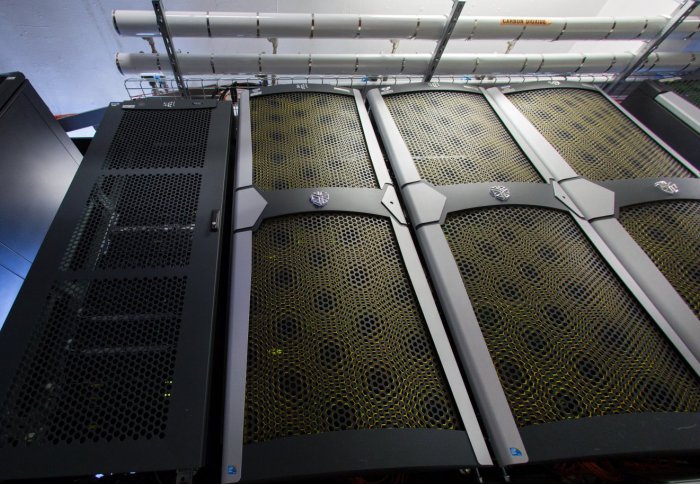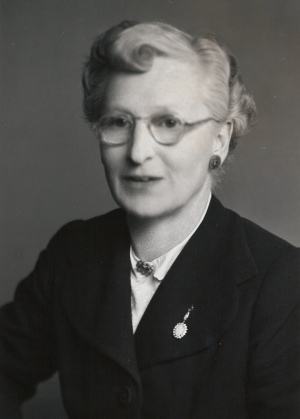Imperial announces winner of competition to name supercomputer
by Colin Smith

You've helped to decide our supercomputer's new name
Imperial has chosen a new name for its super computer, following more than one hundred entries from students, alumni and staff.
The supercomputer’s new name is Helen, in recognition of Helen Kemp Porter who was the first female Professor at Imperial. Professor James Stirling, Provost of Imperial, and Professor Peter Haynes, Academic Champion for High Performance Computing, pored over the entries and decided that Kay Barrett, from the Department of ICT, had put forward the most fitting name for the supercomputer.

Professor Helen Kemp Porter
Barrett, who is a new configuration analyst in ICT, said: “I was looking at all the great Imperial researchers on our website and Professor Porter’s name really stood out. She was a female pioneer and as a woman working in the technology sector, I thought it was important to recognise the contribution women have made to science throughout history. I am also really chuffed that I now have bragging rights.”
Professor Porter, who passed away in 1987, was a botanist, biologist and biochemist at Imperial and a Fellow of the Royal Society. She was one of the first British scientists to use chromatography, which is the collective term for a set of laboratory techniques that can be used to separate mixtures. She also pioneered the use of radioactive tracers, which can be used to explore the mechanisms of chemical reactions in experiments.
Being appointed the first female professor in 1959 was an important milestone in Porter’s career and a big leap forward for the male-dominated Imperial at the time. She had already been elected Fellow of the Royal Society three years earlier. She also held the role of Head of the Unit of Plant Physiology, which was based at Imperial and funded by the Agricultural Research Council, until her retirement from College in 1964. Professor Porter then became Second Secretary to the Agricultural Research Council, and in 1972, Adviser to the Secretary.

(l-r) Professor Stirling, Kay Barrett, holding the winning name, and Professor Haynes
Professor Porter was also very concerned with the organisation of the wider biochemical profession, leading the development of the Biochemical Society in the mid 1960’s, where she demonstrated her considerable administrative and organisational skills.
Professor Peter Haynes said: “Special congratulations must go to Kay for singling out Professor Porter as a contending name for the supercomputer competition. I am delighted that we are able to celebrate her achievements in this way.
“Professor Porter was an early adopter of the latest techniques, using two of the innovative technologies of her day to study the chemical reactions that keep plants alive. That is what high performance computing provides today: innovative technology that enables discoveries in science and engineering across all disciplines.
“Had this technology been available in Professor Porter’s day, I’m sure she would have exploited it to the fullest in her research.”
The competition provided the College with an opportunity to tell the Imperial community about the supercomputer’s recent expansion, which will make it much more useful for researchers. It was also a way of reacquainting academics with some facts about the computing resources available to them through the College’s High Performance Computing Service.
The competition was launched with a news story on September 7. Since then the story has had nearly 4000 page views, 444 shares on LinkedIn and 78 Tweets.
Other illustrious names put forward for the competition included: Joan, after Joan Woodward who was the second female professorial appointment at Imperial; Dennis, in honour of the College’s Professor Dennis Gabor who invented holography, and Eric Ash, after a former Imperial Rector. The competition also brought out the lighter side in many entrants, with some deciding on a tongue-in-cheek approach to the name selection. Some of the comical names put forward included Magnificent Imperial kNowledge Device (MIND), Mr Floppy, Steve and Megatron 3000.
The College bestowed Kay Barrett with official bragging rights at the HPC Summer School today, where she was personally congratulated by the Provost and Professor Haynes.
Article text (excluding photos or graphics) © Imperial College London.
Photos and graphics subject to third party copyright used with permission or © Imperial College London.
Reporter
Colin Smith
Communications and Public Affairs